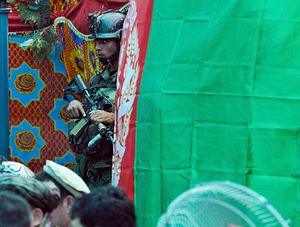Afghanistan presidential candidate and current Chef Executive Abdullah Abdullah announced Friday that he has agreed to allow a ballot recount in provinces where his supporters had stopped the process for almost a month.
Abdullah has served as Afghanistan’s chief executive in a fragile national unity government with President Ashraf Ghani since 2014. The precarious arrangement was put together by then-U.S. Secretary of State John Kerry in 2014 after the presidential election that year, which went into a second-round run-off between Ghani and Abdullah, resulted in deadlock. Abdullah, who had pulled more votes in the first round, lost to Ghani in the second and cried foul. The national unity government has been a cumbersome compromise between the two men.
On Friday, Abdullah addressed the media following a conference with his supporters. He said he won’t accept any election result until all fake ballots are removed.
In November, more than 40 days after the election, Abdullah withdrew his team’s election observers from an official recount of ballots following disputes over exactly which votes to count.
At the time, Abdullah objected to the recount because of what his team said were more than 300,000 “fraudulent votes.”
As I explained in November:
The 300,000 includes 137,630 votes quarantined by Dermalog’s servers due to “small mistakes.” Dermalog is the German company that provided the biometric technology used in the Afghan election. The rest consists of 102,012 votes reportedly cast outside of official polling hours, plus an unstated number of votes cast with duplicate photos or other irregularities.
Afghanistan’s election and election complaint commissions had repeatedly requested that Abdullah’s supporters allow the ballot recount process to move forward and promised to release results based on valid ballots.
Abdullah urged his supporters, who have been blocking the offices of the Independent Election Commission (IEC) in seven provinces, to allow the recount to proceed. The AP reported that it wasn’t immediately clear if Abdullah would send any of his own observers to take part in the recount process.
The results were initially scheduled to be announced by October 19. That date was pushed to November 14 and when that date whooshed past, no new date was set.
According to Tolo News, the chair of the Independent Electoral Complaints Commission (IECC), Zohra Bayan Shinwari, called on the IEC to announce the preliminary poll results “as soon as possible.”
No new date has been set to announce preliminary election results. If no candidate gains more than 50 percent of the vote, a second round will be held. Ghani and Abdullah are considered the top candidates and a repeat of 2014 is possible.
What’s different is that the United States under Donald Trump doesn’t have the kind of diplomatic cachet that the Obama administration wielded abroad. It’s difficult to imagine Secretary of State Mike Pompeo jetting to Kabul and hammering out a new national unity government. Neither, Ghani nor Abdullah look keen to repeat the national unity government experience.
Meanwhile, the United States has announced the resurrection of official negotiations with the Taliban three months after Trump killed a pending deal with a series of tweets.
With reporting from the Associated Press.
































